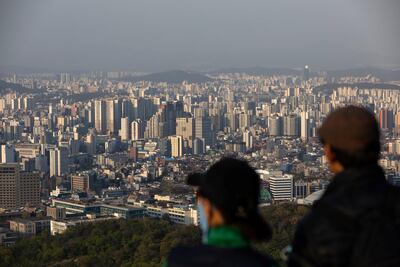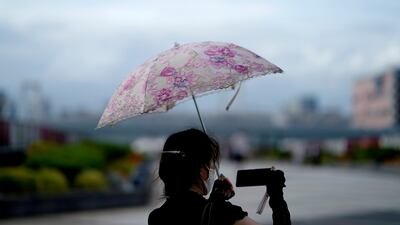The Delta variant is challenging the part of the world that’s been most successful in blunting the economic impact of Covid-19, with Asian countries that snuffed it out locking down again as the virus returns, and others seeing the world’s highest death rates.
Just 12 months ago, the Asia-Pacific region’s rapid containment of Covid-19 made them the envy of the world as the virus ravaged the US and Europe. Now, from Seoul to Sydney, Bangkok to Beijing, authorities are re-imposing growth-sapping restrictions as low vaccination rates in many of those places leave their populations vulnerable.
So far, it’s consumers who are bearing the brunt. The central bank in Australia, where two-thirds of the population are confined at home after Delta slipped through the strict travel quarantine system, estimates spending drops about 15 per cent during movement restrictions.
China is imposing internal travel and movement restrictions in the middle of the summer break as infections return to places like Wuhan and Beijing, prompting reductions in forecasts for growth in the world’s second-biggest economy. Cases there jumped to a six-month high on Friday of 101 infections, with Delta reaching regions that account for 38 per cent of national gross domestic product.
Supply chains from Vietnam to Thailand, where outbreaks are surging, have also been interrupted, with factories that make goods for Nike and Adidas shutting down over virus restrictions, potentially missing out on the crucial holiday shopping season. That raises the prospect of Asia’s Delta hit reverberating worldwide, if exports are delayed longer term.
“The current Delta wave in Asia may snarl production networks further,” said Frederic Neumann, co-head of Asian economic research at HSBC Holdings in Hong Kong. “The risk is that growth scars linger for longer.”
The deterioration in outlook, both for virus containment and economic growth, is in contrast to Western economies like the UK where high vaccination rates are blunting the impact of Delta and travel reopening is progressing.
co-head of Asian economic research, HSBC Holdings
There’s a common theme among many Asia-Pacific economies that enjoyed early success with limiting the virus’s damage: complacency. With fatalities low, authorities in South Korea, Japan, Australia and New Zealand are among those whose vaccine rollouts lagged behind; their inoculation rates are now in the bottom 10 among the 38 OECD member states.
All except New Zealand have been hit by Delta, with infections over the past month surging roughly threefold in South Korea, quadrupling in Japan and climbing 642 per cent in Australia.
Japan’s Olympics – meant to be an economic bonanza – turned bust as spectators were kept out amid yet another state of emergency imposed in Tokyo and elsewhere. While there has been no spread of the virus among mostly vaccinated global athletes, Delta has surged through the local population outside the Olympic Village, pushing cases to a record of 5,042 in the capital on Thursday.
Japan recently earned the dubious distinction of being one of only two advanced economies to have its growth outlook cut by the International Monetary Fund.
China’s Delta outbreak is intensifying economic risks in the second half, coming after a deadly flood and softness in exports and investment. Social distancing measures will likely weigh on a fragile recovery in retail spending during the peak summer holiday period. Airlines’ seating capacity in China has declined 10 per cent from the previous week, and travel booking sites reported a surge in cancellations.
“We have no customers at all because no one is allowed to move around freely anymore,” said a sales manager surnamed Xie who works at a hotel in Zhangjiajie, a tourist destination in central China’s Hunan province where Delta has flared. The 30-room hotel usually rakes in 2 million yuan ($309,000) in monthly sales during the summer holidays, but business has ground to a halt since authorities closed tourist locations on July 30.
“July and August were supposed to be the busiest months for us. There’s nothing we can do but to wait and tough it out,” he said.

Over in South Korea – where just 14 per cent of the population has been fully vaccinated – about 30 per cent of its 205,000 cases came in the past two months alone.
Yet, the Bank of Korea insists the recovery is still on track. It’s a similar story down in Australia, where the central bank is sticking to plans to taper weekly bond purchases even as it acknowledges GDP is all but certain to contract this quarter.
In part, this reflects lags in monetary policy, but it’s also the experience of past lockdowns, when economies bounced back quickly.
Still, the Delta variant has been altering calculations and its highly contagious nature may leave a longer-tail impact on places that overcame previous waves.

Southeast Asia is now emerging as one of the world’s worst hit regions, recently overtaking Latin America with the highest weekly death rate. At the epicentre is Indonesia, where the death toll this week surged past 100,000, although President Joko Widodo is resisting stricter movement curbs that would further dent the region’s biggest economy.
The debate over whether to lock down is particularly fraught in Thailand, as well as Vietnam, as trade has been one of the few economic bright spots. The Federation of Thai Industries recently said quarantines and mobility restrictions are causing labour shortages, forcing companies to cut production.
The disruption is being felt by American retailers, who are growingly concerned their shelves may not be fully stocked for the peak holiday shopping season. The American Apparel & Footwear Association’s chief executive Steve Lamar has asked US President Joe Biden to “immediately ramp up distribution of excess US vaccines to Vietnam and other key partner countries” including Bangladesh and Indonesia.
In India, a deadly second wave that left millions jobless and thousands dead has been ebbing. But the fallout is substantial: the IMF last month slashed its forecast for the year to March to 9.5 per cent, from 12.5 per cent just three months earlier.
Then there’s Singapore. It has struggled to make a planned transition from low cases and strict safety protocols to a “new normal” where Covid-19 is endemic as long as hospitalisations and deaths are limited.
A recent rise in Delta infections forced the government to pull back and re-impose restrictions, although it’s now pledged to reopen in September, when vaccination among the population reaches a very high level.

